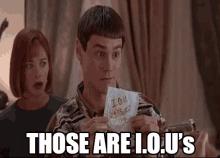As I continue my search for a new to me car, I'm also looking at the financial part of it. I have the option to borrow from my 401k and it almost seems too good to be true. I've never even considered it before, so I'm unfamiliar with it.
The way I understand it, I pull the money from the account. I then make monthly payments back to the 401k, plus interest. All of that money... including the interest... goes directly back in my account. So when the loan is satisfied I will have returned every penny I borrowed, earned 7.5% on that money (the loan interest rate), AND own the asset (car). That's opposed to borrowing from Wells Fargo for example. In that case, my money goes to them, including interest. Is this as much of a no brainer as it seems?? I could just pay cash, but that seems to make far less sense. What am I missing??
I thought if you quit or got fired the loan is instantly due?
Datsun240ZGuy said:
I thought if you quit or got fired the loan is instantly due?
Yes, if I leave the loan would be due. I could manage that. I'm retired anyway, but since I still do consulting for the company a few times per year they still list me as an employee. It's an awesome set up and I plan to stay... and they plan to keep me.
In reply to SKJSS (formerly Klayfish) :
You do lose whatever earnings the funds might have made while in the 401k. (When they are loaned to you they aren't earning returns.)
If OP is already at retirement age, the chances are his 401k portfolio has been set to a low risk, lower return model which may not beat the 7.5% rate.
I'm 53, but retired early. My 401s are set for low-moderate risk. I still expect to see 7.5% or more. However borrowing the money from myself is a whole lot better than borrowing from a commercial bank, right? I'm just trying to make sense of it in my head. Just for easy numbers let's say an account has $100k and I'm looking at a $20k car.
If I borrow from my 401, my account drops to $80k. My payment is $400/month (again, just easy math numbers, not precise). I pay off the loan in 60 months. At the end, my account will be back to $100k (not considering the market changes for simplicity sake here) it started at plus the interest I paid. I will also own the car.
If I borrow from Wells Fargo, my account stays at $100k. My payment is still $400/month, but that money goes to Wells Fargo. In 60 months the loan is paid off and I own the car. My 401 would have the $100k +/- whatever growth/shrink the market did.
Numbers are hard...
Yes you seem to understand it. It's already your money so you can use it and pay yourself back.

From what understand even if you were fired or left the company you could roll that money over and not pay it back in- just roll less. You would owe the taxes and penalty since you are not at disbursement age.
At your age/growth goals it does make sense to me. I think the management fees are probably not going to change.

Sonic
UberDork
6/1/25 9:48 p.m.
It depends on the expected rate of return of the investments compared to the fake interest rate you are paying to use that money. For easy numbers sake, if you expect a 10% ROI on the invested capitol, but you can get an auto loan for 6%, then you are 4% ahead by using someone else's money.
Real world example: my mortgage is at 2.5% I only owe like $90k with 6 years left, but I'm not paying extra as the money I have invested is making more than 2.5% so I'm ahead using the bank's money, even though I could pay it off tomorrow
Compare the actual cost to the opportunity cost to decide.
Pretty well covered already, but yes the only real risk here is opportunity cost. Whatever money you pull out is not invested, so if you pull $40K for a car and your investments go on a tear and return 40%, the $40K portion that's no longer invested misses out on that. The flip side is if markets lose value, you actually come out ahead by paying yourself interest and reinvesting at lower prices.
at near retired age and by not using a large percentage of your assets you're borrowing from yourself. At high current interest rates it's not a bad play so long as you understand the risks, and are comfortable of assuming the entirety as a taxable distribution in the event your employment were to end.
You don't get to keep all of the interest that you pay on it -- some amount (maybe 1% ?) goes to the 401(k) company to cover the administrative costs. That's probably not a deal breaker, but just wanted to mention it.
Not knowing your historical returns and where the money is invested makes this challenging. But given the current investment returns and guessing at your risk level I think a high return right now is unlikely. Consider your return rate for the last 6 months and 5 years as a range.
Guess I need to do a better job paying attention to that stuff. I've always squirreled my money away into retirement funds and let the fund managers handle it. I've paid little attention to it.

Your looking at a arbitrage of your 401k. The only time it sucks is when the 401K makes more the interest you are offsetting. In general it can be better to rebalance around the bond component in your 401K to ensure that you are making more in the deal.
The real question is how much money are you actually making. Lets just say you borrow 100K over a 5 year term. Its "saving" you on paper 22,227.69 at 7.5%. Compare it to something like VTIP which is 3.32% over the last five year and about as low risk as you can get. That 100K would make 17,739$ give or take. So yeah you are pocketing 4,488$ over the five years in your 401K which is a decent chunck of change. I am aware of how grossly simplified I made this and how I am not counting on loan origination fees and tax implications if any.
The better rate to compare against is you high yield savings rate but it should be close to 3% depending on the cash involved and consider the cheaper insurance due to personal ownership, then what it would cost you for CAP insurance on the car to protect your investment.
It may be better to take the loan and put the cash you have into a 401K yearly to reduce your total tax but if your retired or not making money at the top rate that can be a very small number.
In reply to wearymicrobe :
I definitely have a lot to learn. Pretty much everything you said went over my head, LOL.

SKJSS (formerly Klayfish) said:
In reply to wearymicrobe :
I definitely have a lot to learn. Pretty much everything you said went over my head, LOL.
Easy button.
401K
Your paying yourself interest, and saving that interest cost, at the loss of potential gains on that money in your 401K on the money you borrowed.
Loan
You allow your investments to grow at the expense of paying interest on the loan.
You just need ot pick the one that is best for you. Personally I NEVER take money from the 401K, that is future WearyMicrobe money and not current money. The correct play at anything less then 100K with current interest rates. When rates are cheap, sub 4% then it almost never makes sense to borrow money from yourself. When it gets to around 6.5% or higher then you need to do the math.
Also remember there are very hard limits on how much you can borrow and what percentage for your 401K. I have a very permissive 401K and even I am limited to 7% of the total account balance and my current rates are 8.9% and 48 months as the cheapest and longest I can do. Now if you are past 59.5 then the rules are a bit different as well.
One item nobody besides you has mentioned yet; just pay cash.
No need to deal with payments or a bank or a 401k plan. You said you have the money so go ahead and spend some.

If you have the cash leave your 401k alone and just pay for the toy.
If you don't have the cash, but your 401K is fully funded, stop or slow down contributing and save the money outside of retirement accounts to make the purchase. At this stage, you should have a fun money account for stuff you want to do in the short term.
Assuming the money for a 'cash' purchase or payoff is invested and not just sitting as cash, and 7.5% rate for all conventional loan, 401k loan, 401k investment return, and taxable investment return.
1) Conventional loan-
After purchase: -20k bank, 20k 401k, 20k taxable
5 years later: 0k bank, 29k 401k, 0 taxable
2) Cash-
After purchase: 0 bank, 20k 401k, 0 taxable
5 years later: 0 bank, 29k 401k, 0 taxable
3) 401k loan-
After purchase: 0 bank, 0 401k, 20k taxable
5 years later: 0 bank, 29k 401k, 0 taxable
It's just a shell game. When the percentages are all the same, the results are all the same. Which is ultimately the 'best' vs 'worst', and how much by, all comes down to how the 4 relevant percentages end up differing from each other... And unfortunately, my crystal ball is broken.
Thanks! By the way, I do have a financial advisor. He's out of town for a few days and I know there's a wealth of information on GRM so I figured I'd ask. As I said, I've never paid much attention to this stuff.
I learned a new phrase here a few months ago...coastFIRE, or something like that. That's the lifestyle my wife and I are living. For personal and health reasons we decided to retire a few years ago, at age 51. We have enough money for the rest of our lives. No, I'm not about to buy a private island, but I'm secure. We have money we can pull without penalty, but if it makes sense I'd rather have a small monthly payment than pull a large sum of cash.
We "work", doing things we want when we want. We make enough to pay the basic bills. We no longer contribute to our 401.
In reply to SKJSS (formerly Klayfish) :
I can't imagine wanting a payment. It's way beyond math.
How about another option*. Split the cost. Take some from your 401k/some cash/some loan. Less investment loss, but a bit of loan cost. Maybe it balances out?
*I am not a financial planner and did not stay at that hotel last night.
Running some more numbers, it was interesting to see that even if the investments out-perform the interest rate, the 401k loan doesn't seem to significantly out perform the cash purchase the way the conventional loan does. This appears to be a function of them both basically keeping the same amount invested. Paying the interest 'to yourself' sounds great, but ends up being offset by the lost opportunity cost.
So the conventional loan will be the best when investment returns appreciably out-perform interest rates, and the cash purchase is best when it they don't. If you've got the money to pay cash and the credit rating to get the best conventional loan rates, the 401k loan looks to generally just be the worst of both worlds.
The greater the interest rates and greater the economic uncertainty, the greater the risk carried by the conventional loan. So when we had record low rates and record high growth, I was strongly in the conventional loan camp. But today, I'd pay cash.





































